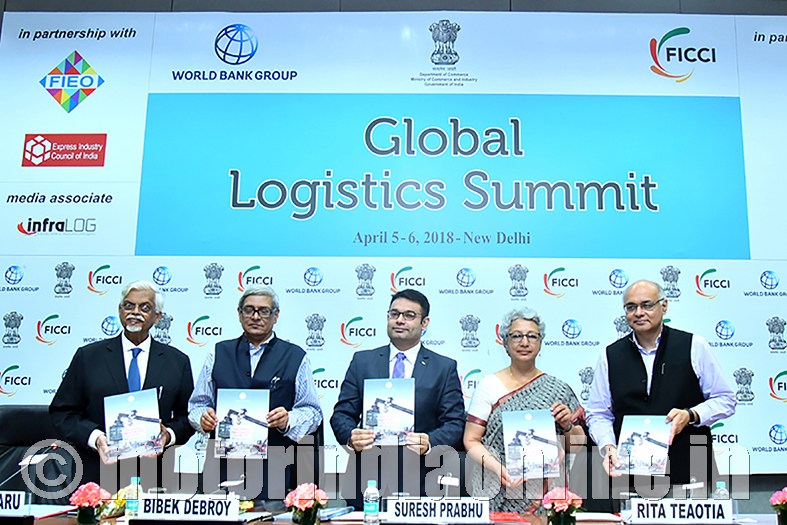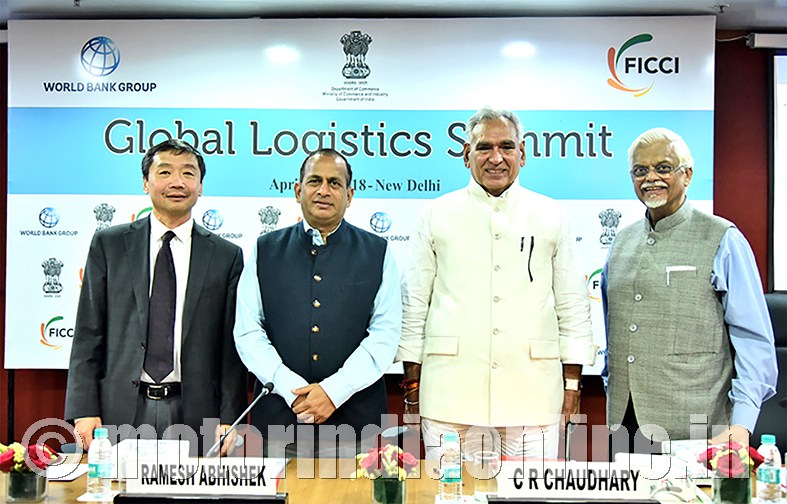The creation of a new division under Ministry of Commerce and Industry and granting of infrastructure status to the logistics sector will aid in its integration and efficiency in the future ahead. Kick-starting conversations on improving logistics at State-level is yet another achievement in the recent times.

The Global Logistics Summit held on April 5 and 6 at New Delhi proved to be right forum at the right time. Organized jointly by the Department of Commerce under Ministry of Commerce and Industry, The World Bank Group, and the Federation of Indian Chambers of Commerce and Industry (FICCI), the Summit witnessed stakeholders discussing on various aspects on India’s experience on Logistics, its policy regime and regulatory framework, technology and digitization, skills and competencies, and other potentials.
In July last year, the Allocation of Business Rules, 1961 was amended to establish a new logistics division under a special secretary-ranked officer in the Ministry of Commerce and Industry. Later in November 2017, the Ministry began manning the new division that is envisaged to integrate and consolidate the logistics sector, which even today is handled by over seven ministries and numerous institutions. No wonder why India still does not have official figure on the country’s logistics cost to GDP. A special secretary-ranked officer is appointed as the head of the newly created logistics division, with a team of 45 employees and power to recruit more consultants and professionals from the industry.
“Integrated development of logistics is now ideally addressed within our Ministry in a comprehensive manner by way of this newly established single nodal agency”, said Mr. Suresh Prabhu, Minister for Commerce and Industry, in his inaugural address. “The country’s potential is not fully realized owing to a plethora of higher costs and macroeconomic issues. Making the entire operations integrative, efficient, digitized, and standardized is our priority”, he observed. The Minister expressed his confidence on the positive impact of State-wise logistics index in improving the business at the sub-national level.
Adding to the Minister’s observation, Commerce Secretary, Ms. Rita Teaotia, emphasized on the need to bring down the country’s logistics cost to at least 10 per cent of GDP. “This is being achieved by unprecedented investment by rail, road, shipping & waterway infrastructure. The aspirations for economic growth, employment generation, manufacturing and exports are all inextricably linked with the issue of logistics and it is an essential element that has the capacity to make that quantum in progress”, she said in her address at the Summit.

Policies and Reforms
“Connectivity and Logistics are the prime takers of India’s next-generation growth story”, observed Dr. Hunaid Kamal Ahmad, India Country Director, World Bank Group, by stressing on policy and regulatory reforms and transversal policy coordination in the sector. He also added that management of investment financing in the industry is crucial so as to realize its global potentials.
With the Finance Ministry approving infrastructure status to the sector, the logistics companies and start-ups can access cheaper loans from financial institutions. Yet, observed Dr. Sanjaya Baru, Secretary General, FICCI, a balanced development of ‘hard’ infrastructure and ‘soft’ infrastructure is of great importance in improving the state of the affairs in logistics. By ‘soft’ infrastructure, he meant attitudinal and procedural ambience that prevails in the business regime that includes regulatory institutions and private players.
While acknowledging that Indian logistics industry is still largely informal and unorganized, Mr. Bibek Debroy, Chairman of Economic Advisory Council (EAC) to the Prime Minister and member of NITI Aayog, said that procedural improvements are ineffective unless a full-fledged GST is on the effect. Such improvements are complicated because of existing preferential export incentives, he added. Mr. Debroy also revealed that EAC to Prime Minister has decided to bring out a comprehensive document on logistics issues and solutions to help the Commerce Ministry.
Technology in Road Logistics
Discussing on the India’s experience with logistics, the speakers at the summit stumbled on the higher direct transportation cost in the country, which accounts for around 60 per cent of the total logistics costs. “Bringing the involvement of cargo fleet owners and users in deciding the efficient modes of transportation is necessary to tame higher direct costs”, said Mr. R.K. Agarwal, Joint Secretary (Ports), Ministry of Shipping.
The participants acknowledged the phenomenal initiatives taken up by the road logistics in reducing costs and improving efficiency using ICT. “Extensive use of technology in bringing down the costs have proved successful globally. We at Rivigo understands technology well, have achieved great success in integration and inclusion of diverse stakeholders in the business chain”, claimed Mr. Deepak Garg, CEO, Rivigo.
Mr. R. Shankar, CEO (India Operations), TVS Logistics Services, traced the exemplary role of technology in his company operation on four crucial aspects. This includes digitized inventory management in the entire chain, better and efficient packaging and warehousing (especially for auto parts that the company predominantly deals with), improved productivity of workforce, and efficient leverage of ecosystem in the entire processes.
Industry experts also raised the larger issue of quantity and quality of drivers in the country. A lot of large TPL and tech logistics firms have set up driver training schools in the country. Rivigo’s CEO Deepak Garg proposed his firm’s ‘Driver-Relay’ model for own truck fleet as an apt solution to tackle driver shortages that is work emulating. “Using ICTs, we could improve both the transit speed and fuel efficiency of our fleet, with positive betterment of the lives of drivers”, he claimed.
E-way Bills: Long and bumpy, but steadily stabilizing!
With the introduction of electronic way bills for movement of goods of worth more than Rs. 50,000 in value across State borders since April 1, more than 2 crore e-way bills have been generated in the first 24 days, according to GSTN. Aimed at reducing multiple inspection and travel time of cargo transportation, the e-way bill system is expected to make life easier for truckers and transporters who have to stop at every highway checkposts and generate challan while crossing state borders earlier. There is no need to carry physical bills as well, a mere SMS with unique e-way bill number (EBN) is sufficient.
Although the e-way billing hit the truck dispatches and inter-State movement initially, the movement of goods and e-way bill compliance is gradually stabilizing without any adverse feedbacks from transporters. As of May 1, 18 States are on board the e-way bill system. “It is an additional compliance for us, but at least huge chunks of time can be saved at tax checkpoints in generating manual challan. Nothing has largely changed so far since GST enforcement last year, this e-way bill system can help break regulatory barriers in inter-state haulage”, observed truckers at Sanjay Gandhi Transport Nagar (SGTN) in the outskirts of Delhi. Transporters also feel that long waiting time at toll plaza is still a severe bottleneck to speedy delivery of goods, even as tax checkpoint stand removed.